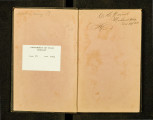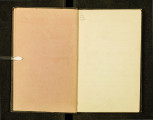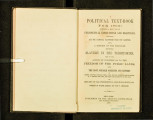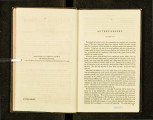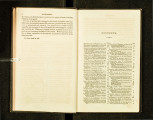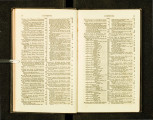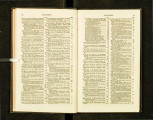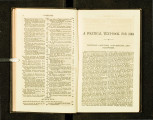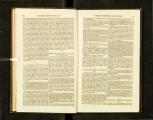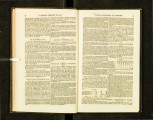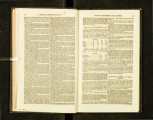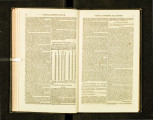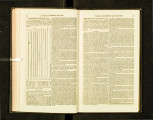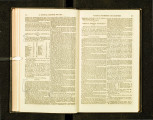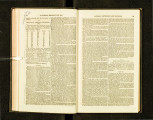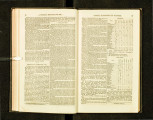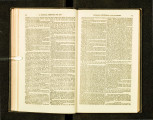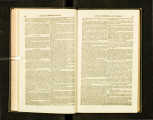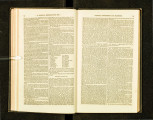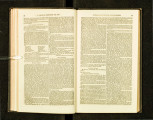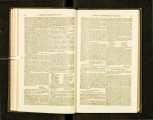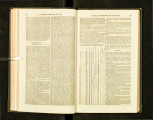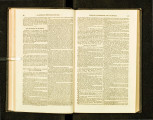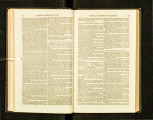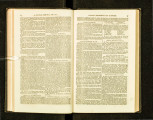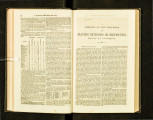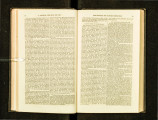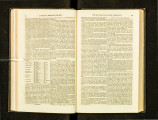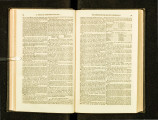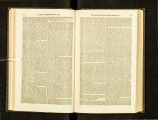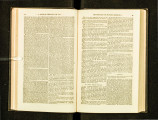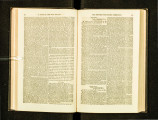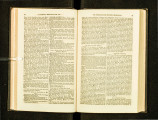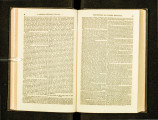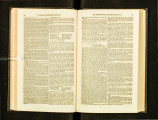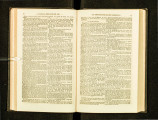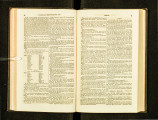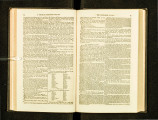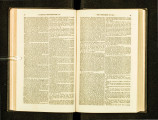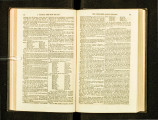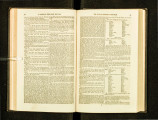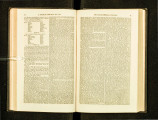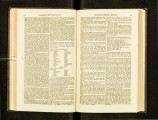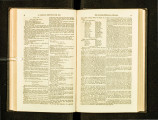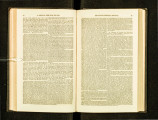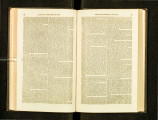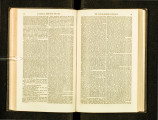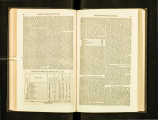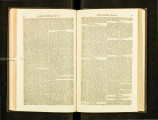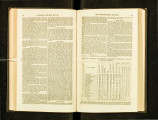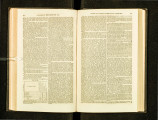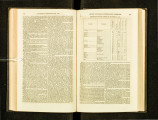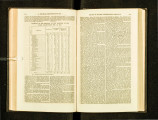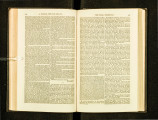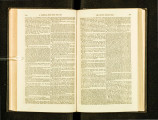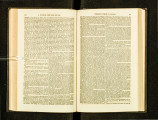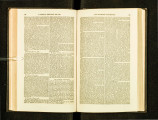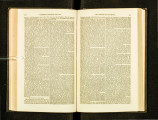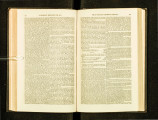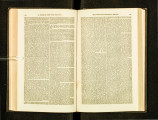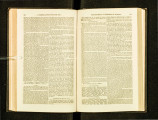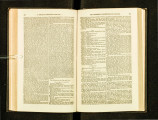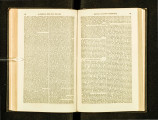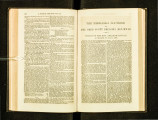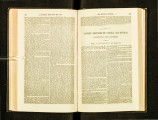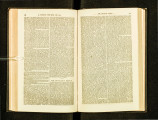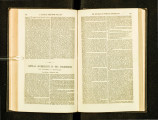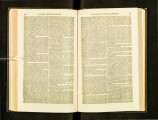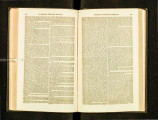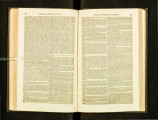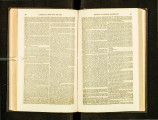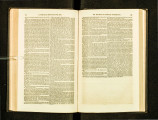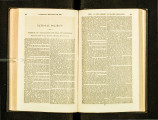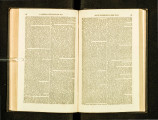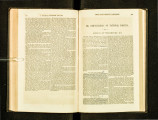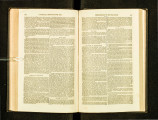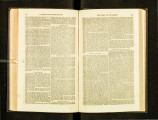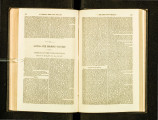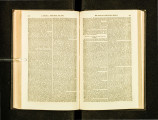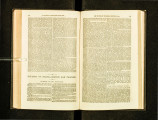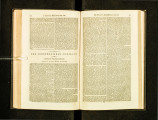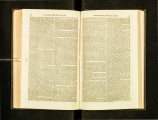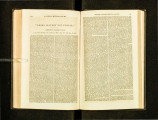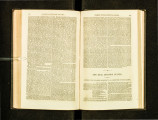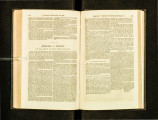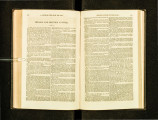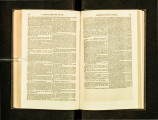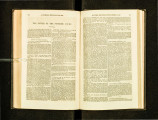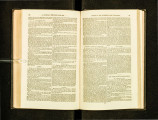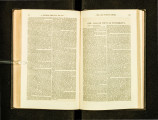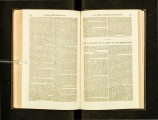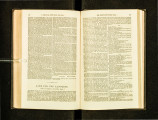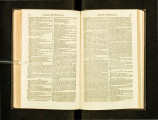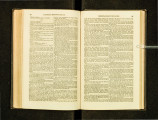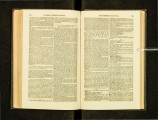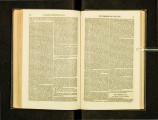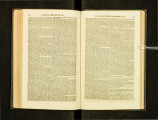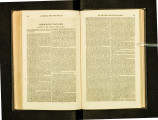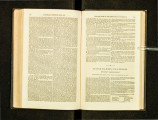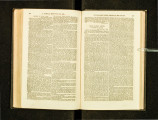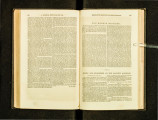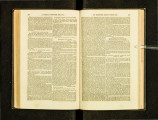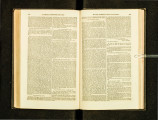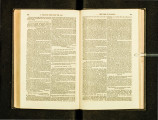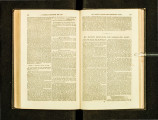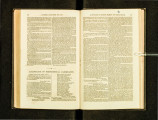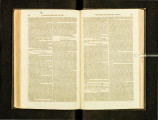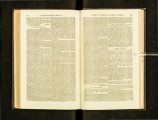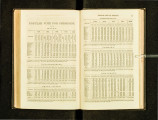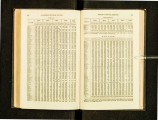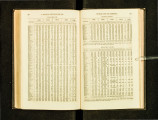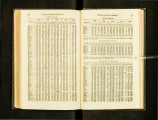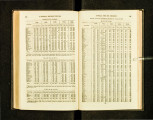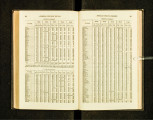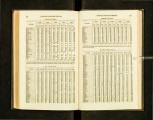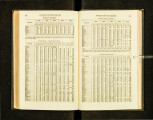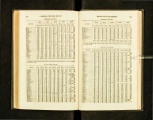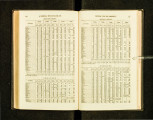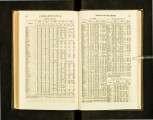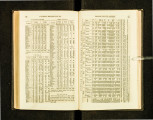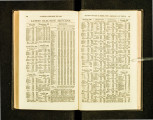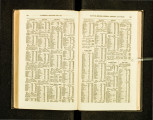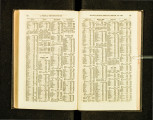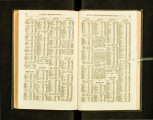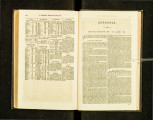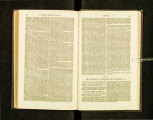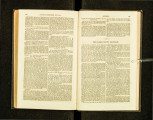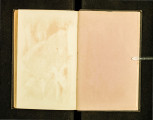| OCR Text |
Show 168 A POLITICAL TEXT- BOOK FOR 18ot John llrO\vn's sentimenta arc right; 11.nd thci: uenun- ' It il!ln vain to say that this coulu be onllurou . it Is slJ» elation~ against the Constitution, 1md against the most p ly lrnposslhle. ' h~\llowed uames connected \fith It, are perfectly justlUa- ~ What, then, rcm<\lns to be <Uscna~cd? We. Tho nt!gro race it! upon u:1. With :.1. Oon~ti tutlou whlo' 'l'h friends of truth-the patriotic Americans who woulcl held them in bondage, our Federal Uniun might be pr~ su..~tain their r ountry's honor against foreign rivalry, and served; but if so holding them lu bondage be 1\ thlu~ fo• dJ fcn.l their country's interests again:lt :til assallantl!, err bidden by God :\nd Nature, we cannot lawfullv ~(1 ho~ grcall.r wlwn th..:y contend with th..:::1c men on un.Y point them, ancl the Union must peri:ih. • but 1>nc. 'l'hl'ir gcncml principles cannot be refuted; Thill L; the ine,·itable retmlt o! that conillct whk.h h~U t!1~ir logic I · irrcsi;;tilJlu ; the erro r, if any th ere be, I:~ In now reached Its climax. thdr pr c mi~L'S. '!'hey o.sscrt that n cgro ::\lavery i3 unjust. Among us at t he n orth, tho sole questit>n for reflection 'l'hL~, and tlli>~ nlon ·, of all they say, ill capable of being stucly, and friendly Interchange of thought :~houltl be-1~ fai rly argued l.l ~ain!:!t. negro Slavery unju~t ? The mtion:\1 ancl tliHpa~~io nute If till::! pro po~;ilio n cannot be re futed, our Union cannot ln4ui rer will 11nd no tllniculty l11 an·lring at my coud u-cotlurc, and it ought not to endure. sion. lt ill 11t :mel proper; iL i:;, in itK own nature M 110 Our negro bondmen c:w ucilhcr he exterminated nor lnl!titution, benetlcial to both raceH ; ancl the clrc~:t' of u.u transported to A fric:~. 'J'hey nrc too numerou~ for either ass 'l'tlon !11 not diminished by om admitting th11t m:my proce s, unci either, if pmcticable, would lnvol ve n. viola- fault~ are practised under lt. I t~ not such the fact In re· tiou of humanity. If they were cm:mclputcd, they would spcct to all human ln.ws nmllnstit utionH ? relapse into barb:u-ism, or a set of ncgro St:\tes wouhl lam, gentlemen, with great rel:!pect, y oms trulr ari;;e io our midst, possessing political equ:~lity, and cnti- OuAHL.t>s O ' U~l<OR. Ued to social t•qu;dit.y. 'l'he division of p;irties would soon make the n egro members <L powerful botly in Congrcsswoulu place some of them In high politicnl stations, and occasionally let one lnto the exe\1Ullvo chair. To Mt•ssrs. Leitch, llurnet & Co.; 0 Pn. W . • t: .Tt•hlu.l R;•ttd; BruiT, Brot.her & Sea.n~ r; t;. B. llatt'lt & t:n. ; !lad ~. Nnu lc & l 'o. · \\'csson & \Jox; <Jr ouln, llurxthal & .·car . .; ; At wa~t:r, ~lul!o.·J & Co. · ~--- IIERSCIIEL V. JOIINSON ON SLAVERY IN TilE TERRITORIES. On the 7th of July, 184.8, while the bill to e tabli h the Territorial Gove rnme n t of Oregon wa, under con ·idcration in the United tates Senate, the lion. llc r c h cl V. John. on, then a member of the Senate, from Gcor·gia, and now a candidate for Vice-President on the ticket with Mr. DouglaR, made a lengthy speech from which we cxLract the following : It remains now to consider the question involved In the amendment proposed by the Senn.tor from Mls•is· sippi (i:\lr. Davis). 'l'hu.t question is, whether it it~ the duty of Congre~s to guarantee to the slaveholtlcr, who shall remove with his salves Into the territory of the United State$, the undisputed enj oyment of h is property In them, so long as it continues to be a. Territory. Or in other words, whet her the inhabitants of a 'l'crritorv' during their Territorial condition have the right to pro~ uibit lavery th erein. ) l'or the purpose of this Question, It matters not where the power of l egisl:~ting for the Territory n.~i rle.;whether exclusl vcly in Congress, or j ointly in Congress and the inhabitants, or exclusively in the inhahitunt.s of the Territory; the power Is precisely the same- no greater in the h:wds of one than the other. In no event, can the slaveholder of t ho South be exclude•! from settling In such Territory with his property of C\'ery description. If the right 11f exclusive legislation for the 'l'erritories hclungH to Cnn!l"ress then I have ~:~hown that they have uo Constitut ion ttl p~wer eithet· cxp1·e~sell or implied, to prohibit Slavery thercil;, Uut suppose that Congress have the right to es tabli h a 'f erritorial Government only, and that then, all fu rther governmental control c~a~cs; can tlae Territorial Legislature lla~5 an net prolnbtting Slavery? Surely not. !<'or the moment you admit the right to organize a Territorial Oov~ rnment to e~ist In Congress, you admit, neceil~al'ily .he subordlnntwn or t he people of the 'l'erritory- thl!ir lcpendence on this Government for un organic l!\w to ~lve them po.litical existen ce.. lienee all their legisla\ wn must be tn con formity w1th the organic law · t11ey c~n pa. ~ no act in violation of It- none but such ds pernuts. wee, therefore, Congress has no power us I have shown, t.o p ro hibit Slavery, they cannot delegate B~Ch ll. power ~0 the inhabitan~s Of the 'l'erritory j t hey oa~n o t author11.e t he 'J'errltor1al Legl~ latu re to do that whtch. they have no power to do. The stream cannot rl~e lughcr than i t:~ source. This is as true In governments a · in physics. It ill ltllc, however·, to dl.,cuss this question In this form. For if Congrc!'.S po:;scss the power to organize temporary jl;Overn~ent.s, i~ 1uust then possc~s the power to l egi~h'\te !or the ll·rntmws. If they may perform the greater, they rua.y tJ1c les15; the major incluues the minor proposition. Jlcnce Congress has, ln nil cases since the fnuudation of our go,•ernmcnt, reservetl a veto upon t liP l egi~lntlon or thc territorial gO\'Crnmcnts j it lR a{J~o/ ult'l?l nel"€8/lfli'!J, ln orucr to restrain them from violationR of lhc Con Lill). tloo and infringements of the ri~ht:~ of the StiLtcs, a~ j oin~ ownc1·s or the public lancls. Jf, thr refore, the uct of tho Territorial Government, prohibiting. ' Ia very, lioultl be scnl up to Congre~s for approval, the.r would be hountl to with· holtl lt, upon the ground of its being an act which Congro:&l themsch•cs could not pn~s. But ~ u ppo~~e the right of le gl ~l ation for the 'l'errltory be In Its lnl mbiliwtt~, can they prohibit ~ l av e ry ? Stt~•e tu 110t; ancl for reasons similar to those wlaich show that Congress cannot. 'l'he 'l'crrltorlcli! arc not lmlepentlent, of, hut subonllnnte to, the United ::-tatcs; nntl therefore their leglsl:Ltion mus\ be ~u b o rtllnate. Let us look at some of the limitations which this tnnclition hnposcil. UrHkr the Constitution, "No tille or nobility shall he grantl•t: hy the United States;" "Ooug rr ·s :;halluwke no law re ~pectlng the c~ tahli::~hm e nt of religion, or p •rtaining to the free exercise thereof; no rl!ligious tc!:lt shall he r l'quin•cln!l a. qualiflcation to any ollice or puhlic trust uutl •r the United :itates," etc. It i.'i true, th ese rest l'ict iorrH tlo not npply in terms to the 'l'crritorlet ; hut will it he conterHletl for n. momc!.U t.hat tltt•y woultl have the ri.rht hy l e~-:i~ l:dion to lny these impositiuns upon cit izen!:l ~f tlic Htatcs who emigrate thither for s.:ttl cment? . • • Sovereignty follO\fS the ownership or tiiC domain, a.nd th cn ·foro the sovcrel.c;nty O\'Cr the 'l'errl torics is In tho • ta le!; in tht'lr confederate(\ capacity· hence the reason that the lcgi~lation of Congres~, ;u; t.he 11tgent of the St1~tes r e~p ec ting the Territ-ori es, must he limited by the ObJect of the trust, the situation ancl nat urc of the property to be ndministererl, antl the r •spcetivc ri ~-:hts of the proper owner!:!. Now if the ilove rci,nt v 0\ cr the Territories 11 In the ~tates, <~wl the right ott •gl~lation not In Congress, hut in the lnh:tl)itants of the 'l'crritories, it 1:; evident thn.~ they can lmvc no higher right of 1 •gishttlon than Congress coulll have; they must be hound hy limitations just m~otioned; anrllf the prohibition of ~lave ry in the TcrrltonCll by CongreKs he Inconsistent with t h e~o limitations, Its prohibition by the t errltoda!lcgilllature would he so llkew13e. If possc:<slng the right of ll·glsl:Lt ion t.he lnhal>ltants of the Territories a rc bounrl ))y the llmlt atlous to which I have nlluclctl, lt may he nskecl who holds the check upon theh· a ction ? I r eply, that it iii indl,;pelts:\IJI? for C?1}o gre1:1:~ to exercise the veto upon tla clr le)<islalron. "ho else shnll prevent their pa~slng lawH In violation or thtt cq u: ~l rights of the tate:i In the 'l'l' rritory, which is tho common property of all? Without the retention of II vct:o upon tho lcgislatlon of the 'l'erritorial Oovcrnmcnts, woultl mn ke the iohahltants of the 'l'crritory intlepentler of CongrcHs; aye, it woultl establish the propo~itionl th the moment you conquer 11 peot,!e they rise super ~r the government that cou4'lo.Jr~. Nt•w-Mexico aud Cal· TIERSCUEL V. JOII~SON OX POPl fLAR SOVEREIGXTY. n1 OU11Ihyhcllt.Y· butforallthepurposes of thlsar- ~ a majority OllC by twen ty nlCnlhCrS Of t!1C a 1\e~~t we have 1\cqulrt!d th em hy conl]uest. 'l'o assert, Comlllittcc nnc.l a minority one by fo ur me1 guru , tl at th ey have the rlHht to ll!gblo.te over ali i 1. l' ) cJ' . . . 1 l. l 11 l thPrefore, 1 .1 't .,.1 • ·y fl · ~Jiite the consent of the ht' n! w IH! 1 alter IVIS10ll 1nc Ut t'< c rsc H bjects to prohl su . ) l • tt \ cr ' ~ V J l I I . . d d l d !=(t t"a is to S'\Y that by our conquel!t of th em, . o mson w 10, ns c H\ll'lllllll 1 111tro uce t JC tU.hn,r tcb C(''O laii C- ~in-VCHt.crl W'.l lh ri~h' t t!U!) •n· or to t 1I O~e 0 f 0 Oll· llll·J lOl'·l ty repOrt. r~r~. The in!ltltulion of ,'lav t•ry is aua,·antn.d by the T he i.wo reports wcr disc u ~~ed hv v:ni o u:~ g c · i 1u nf the Uullccl :'ta.t ,•~t, ~tnt! It has the .,ame . . . . Con~trt.tu.t ( tl nwrr around It whkh J.{Uanl:i our dtizent~ perf- Oil~, ?llr. John ~<on d<'f e n d lllg lu ~, ttnd Howell PI"Oft>t' IIIII 1r . · · · · . t thl' ~-(ran ting of titl e~ or nobility or the clltubllsh- Uobb 'ecret:Hy of the Tre asury , a cting as paclh-an) H'('lIlIltf l~of· r,•lir.tiun ; t1 t~ ~>re.f·0 1 "1' <•' 1 111 0 n 11 ·' w, 1 ul rl be l),• mucA 1 1 1 1 ' • • •• , ('at or. The latter ,.,.e ntleman s talc t t mt t 1ert') I 1 veto .111 ·~ct of Tcrntodal le)W!l at\on pr ohtbttll1g . 1. t? l . . l . J bounr 0 1' 1. ,', tl " t!C ri «ll tl! of every citizen of the wa:; "no dtf erc n cc 111 t lC pr1 11C.:lp 1'::1 (' JJUIIC1 a t l' It a~ 'lll act. \' o ,l olllJ.;" 1-. .. • • U . . tt' · 1 ' n· in b o th tho llHIJOnty nn llllllOn t y r t• p ort~. e~;~~. \~;;n ~nn~._:.'l'ltis l~ ll fr rc 'l'nrlt~ry < ~ •w-~l~xlc~) 1 ' l'h <'rC were only two minor ll ifli ·n ·r; t:l'S; ouc v ~ 1eakliw a hout. Hu p p• t~e a !S ortlt Caroli r11nn em!- l ... · . · 1 .. , l l nmHO\ · 1. ,., .·. ' tl II l · v ·~ ·1 thcy lnHHt cit!ter bc W:IS that tiC m,IJOUly r cp01t ll llOISCl llC ltl('S to 1\ ~·w-.\lcxu o WI l l ~ ~ .L c.,. ' . 1 Cl 1 C . gr · 1 1 .1~ 1 ,r0 11n ty or not · who has t he right to J eter· -: r e c. :;1011 from t JC HH cston ou ventton-rcco~ n 1.rc • v • ' • • • • 1 u min. tlt at qucstiou '! . while the nuuo n ty UC1thc t· HH o rse n o r COlll - Mr .. lohnson.- l think thn.t q ut·st1~11 bas alr~acly . h ·en 111c 11 <1ed the action of t h e Gcor•Yi:t d eleg ate :'! decldccl hy the late t reaty (with .\l t·x H'O;. . . ow, IS nt~t , o lavery ir; th•~ L"nitetl :-\tall-:; a pnlil.it-al as wr ll :~!1 a mum- th e r e . . . clpalln~titution? It is mt r n ldp~d, 111thnt It>~ (:nor~ coutrol T he res ult was, that the lll:ljOl"lty I' po rt was an(l cnnli nuancc bdong to th' ::;t;Lte In whkh It l'XI~ts ; anti ·Hln pt 'd b y n vote of 29 ~ to 41 wh ' 11 t he It l wi lt ic:d h "CiLUHe it h n ·n \l{lll7.1!tl hy the or l{anlc Ia w • . . 1• I l u f M . i l > oC ~l~e Oonrc:leru.cy , and cannot he changl'(l or a l.tcretl by lll111 0 n ty, u n <. c r t lC ca 0 1 .. o l\1 on, se-c ·e " w'rthout 1m amenclnwnt to the 'on~tltut1o n; and c e cled orc•alllz c u anothe r Convt•nllon an J np-on! P h~, I r ftl f tl • • I? • I because it is :t fun tlarn 'lata! law .• that t 1ree- 1 18 o I\: pointed I\ ful l lkle t•atiou to B al t 11110 re , w 10, ehlVC~ arc r ·prcseut.etl In ~he 'ratt110 11,',~1 ~·~gl~~~~~.·~~\n~~~\~ft after d CIII:tiHlinrr the ir ,ca tA, wi th drew the ir political upon the E:xecutwn o lC L rea y t::. . . ,., l b •f . t l AI , leo 'it extended eo i n8ta11ti, over t h•! 'l'crntorles .or clallll:i, and r c ttr cu fr om t 1e c ontc.Rt e 01 c \C N~~. M ~;-.i co ar.cl Callforni:~. 'l'h ·n, 1 <~ay, if a fcllow·Cit i- Con ven tion hnd d ecided the qt1e!:it10ll. ten or the Rcnat?r rr.om ·or t.h Carolina t tllr: l'\1 ~\ll~.~:;') The f'ollowi n" is the repo r t p n ' ·utcd to there· •re to remove wtth lw; Hlaves lllto N ·w-.Mcxlco, hi~ !If; It b ' • I '1 J l ~~\bdr u~e and servicc ls gu:1mntced by the ConHtitutlon gular Milledg eville Con vent1011 J)' u r. 0 lllSOI\: .. or the United ~tu.tes, antl uo power on earth can d epr~v~ :\UNORITY nEPOitT. hlm of t la!'m, . . 1 t ill a mi application of te rm~ to ~peak of proh iiJit in ~ , lavery In the t erritory or the L uitetl l~tcs. lt already exists in cont.cmplatlon of law, a.n~l the legis lation proposed wrohihition) arnounts ts nhohlll)!l· . . . Hut su ppose, l\lr. l'n·~itle nt, y ou ha ve lhu n ght to prohibit ~l;L\'l'ry in the 'l'erritorles or the Cnited • tal es) what hl~h politic;tl con::~idcmtlo n require!:! y ou to exerct:>e .It? All must <ICC that it •an not he o!fl"I!C l l cl without pro~lucur g a. ponultLr ' co1uvul11ioru 'll'ltich will Jn·ouauly dtssvl;ve tkis U1~ion. 11 CAl'JTAL SllO LILO OWN LAIIOR." Mr. TT c rA~.:h e l V. J ohnHon made n. speech n.t a Dcn1ot.:mtic meeting in Philade lphia on the 17 t h of 'cpt e mbcr, 1 5li, in which the n c wsp:lp<' r:'l r eport him as having Rai l1, among othe r tl11ng~: "We h elieve that capital sh ould own labor; Is there nny doubt tlutt t.herc mu!it he a laboring cl ass every where? 1 n all countric:1 and under every form of ' Oclnl orgaulza tion th ere mw;t he a lahorlng cla. s-a clnss or men who get t lteir living hy the sweat or t!1eir brow; an~i then the• c must he nunthcr clltH!I that cont rols anu dlrects the Ct\pital of the country." MR. JOIINSON1S VlKv\'S ON POPUl, Alt SO \" ER~; !(;:\TY. Afte r the adj o urn1n nt of the D c moc r u ti.c Nation;d Conve ntion from Cltarle~ ton to lhlt1- more a DclllOcmtit.: State Convt•ntion met at Milleugc ville, Ga., on the 4. tl~ of June, to ~ak c action in reg ard to the ccc s1on of m o Rt of the G o r g itt u c leg tltes at Chnrlc ton. It • ~ems tha~ a Business Uommittcc of 2·1 wus appollltcd', o.1 which Herschel V. Johnson was o ne. 11us Committee disagreed as to th '.propriety o~ appointin ~ uew dcleg n.tcs to 13altullorc, tlte fnc n~~ of the Scccdcrs opposin ...,. anu a ~ w who pr cfc rre u to sec Dourrlas elected to a di. solution b of the p a.t·ty, favori ng that step; and the con~c-qucnce wus, that two reports w e re prcscutrd - J~cllolrerl, 'J'hnt we r eafli r m the ~incl un atl Platforlll, wl~h the follow i n ~ atltl itional propoHilrom!: 1~t. 'l'laat the t:il iz ·ns of the l 'nitctl t' t1.1tt•S laa~e llll.('f(UUI rlglat to :~l:lt lc with tlteil" propert!/ (>j Oil!/ kuul, Ill the organize<! Ter rito ries of the lJnite<l H~at• H, Hll_'l lln~ t uncler tl , decision of the Supreme Court ot thc L nlt l'd late!! in t~u c ~e' or ])re<l Scott w!.lch we rccog1 ai~,., a~ the correc~ •x~>o~\tion of the COI~Rtitution in tl1is pa rt icular, ~Jlwoo e'1·operty stand.~ 'l.tpon the 8fL?IIO j oo(ill(/ u., ul~ , oth.er ~eBcriptivn ., of p roperty, and th at 111!1/hn·llte (, <1WI al (} YV()I' /t'l"lte1lt NOit ANY 'J'Ell i\ITOH I.\1. UonmNM~: N 1:. CUU cl;stro1; or ·i~tpair U1e right to ~<lwne JII'OJ!t'l'ly Ill th~ comm<in Terr itories, any mor • than the rit-(ht to any ~tha dexcr·iptiOlt of J)I"Vjl61'ly j that p rOih'.rty of, a ll kmliS: slaves ns well as any oth er !lpcrtc~ ot propl rty, ~n th.c 'f~rritorlcs stand upon the S~\11\C equ:~ I and hrm~d co.n~tltutlonal bt;sis,ancl suhj cct to hke pri.n~rplc.s c?f r~coyntll<:'' mut JJI'oteetivn in the LEG ISJ.ATrn :,.l tuhct.ul null t'\te<: tl-t 've departmenl ll of the f./vvermnent. t 2d. 'J'hat we will support nny !l"lll " ho mar_ ~>.e n.or~1~· t ' I by the liultlmore Convcutwn, for the lr c~itlenc) ' n~ c ~ oldd t/te 1>rinciplex set fo rth in the foregomg prow ~~r' and who will give them /li.'l ·illrl<n·Hemelll, anu pos JOn, Ill , t llol·' ourselves bourHI to support any lllan, that we w 11.1 " • · ·I 1 . ·,._ l I ' tile nominee who cntcrtaws pn nc p LS t w 10 11111Y ) C ' • 1 • ltion • ' 8 t •nt with those set forth m the a .>ove Jl!?POll , t~n'~L~ILoc denie.~ that hlcrve J>r·opel"ly Ill t he I erritnric.s ~ocs stl~nd on WI I'<J ll ll ljiwti n(J, anti on .the Bame Colllsll-- tui i uallHl·~i., of othe,· rll'•'criptivn~ O.f prOJHll"lY. t~ vi ·w ut' the fi~Ct that I I l ar~c nwj ont ~· of the. d~lcgnt~~ (' . f It it to be their tl utv to \\ rtlnlnt\\ from t c f.r~ l·nl)~~~~r;~~~~t lc Convention at Charlc~ton , tl~erelly ~~l:;~ i~iug ~his :'tate of h ~r vote therein, accordrng to t le ~ el·lb ' 1 of ::~ultl UonHntlon. . , ~ull!ved 'J'h·\t thi::! Oouv ntion will nppomt . twenty e v four ' rrom the Htate ut lar)(e, and two frolll delcgntes- . 1 D' t-' ctr-to represent the Demol~ratic each 01>11(-:~·~::~s::~~la in ~;~~ 1 utljournell Conv1•ntlon at Haitiparty of U coq~ r.t,l . t ltl tli 'Lt S'litl delc••atcs be and more, on til u, I t. 1 tns . • !ll .' u' t the. jV• I"' I'fJ01· 1l!l }11'0· the): ~re hereby llls~· ut~te!1, t~1{j~1~11on f,y the Natio 'w~ polii/Wll ·~, (lll~l (1,/l,. . leU li~:HSC.:Iil'!!. V. J orrNSON, J)emoc.;ratlc cowt cutum. 'l'uos. 1'. 8 ~ n-or n, 11. K. McCAY, A. COL.YAIU>. |



